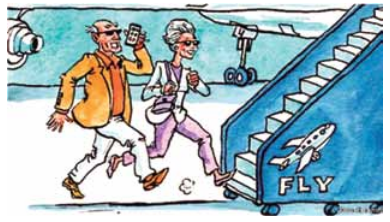Leia o texto para responder à questão.
Dawn of the pre-tiree: What to call the time of life between work and old age?
To get the most out of longer lives, another age category is needed

What do you call someone who is over 65 but not yet elderly? This stage of life, between work and decrepitude, lacks a name. “Geriactives” errs too much on the side of senescence1. “Nightcappers” risks being patronising. Perhaps “Nyppies” (Not Yet Past It) or “Owls” (Older, Working Less, Still earning) ring truer. Branding an age category might sound like a frivolous exercise. But life stages are primarily social constructs, and history shows that their emergence can trigger deep changes in attitudes.
Before 1800 no country in the world had an average life expectancy at birth beyond 40. Today there is not a country that does not. Since 1900, more years have been added to human life than in the rest of history combined, initially by reducing child mortality and lately by stretching lifespans. Longevity is one of humanity’s great accomplishments. Yet it is seen as one of society’s great headaches. The problem lies in the increasing dependency of the old on the young. As the world greys, growth, tax revenues and workforces will decline while spending on pensions and health care will increase. So, at least, goes the orthodoxy.
Doom-mongers2 tend to miss a bigger point, however. Those extra years of life are predominantly healthy ones. Too many governments and firms fail to recognize this fact. A more radical approach would start by acknowledging that, in the rich world at least, many of the old are still young and active. They want to work, but more flexibly. They want to spend money, too.
Declaring a new stage of life could help change perceptions. It has done so before. Today’s conception of childhood emerged in the 19th century, paving the way for child-protection laws and a golden age of children’s literature. Spotty, awkward 15-year-olds predated the 1940s, but only then did mystified adults coin the label “teenagers”, fuelling all sorts of products and services, from bobby socks to the music industry. In 1944 Life wrote that “American businessmen, many of whom have teen-age daughters, have only recently begun to realise that teen-agers make up a big and special market.” So, as life becomes longer, the word “retirement”, which literally means withdrawal to a place of seclusion, has become misleading. At 65 you are not clapped out, but pretired.
(www.economist.com, 06.07.2017. Adaptado.)
1 Senescence: the condition or process of deterioration with age.
2 Doom-monger: a person who predicts disaster.
The article puts forward the idea that
Lê-se no subtítulo e em grande parte do primeiro parágrafo.